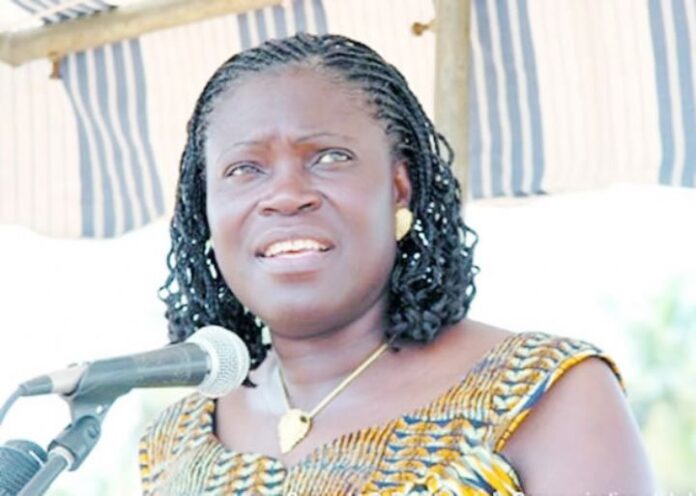On Saturday August 20, 2022, former first lady Simone Gbagbo was elected president of the political party called MGC with 100% of the vote. Created last September, the Movement of Capable Generations was a citizen entity supporting the former first lady of Côte d’Ivoire.
Elected for a 5-year term renewable once, the new president of the MGC is satisfied with the progress made in such a short time by her political party. “We are there! Our political party, the MGC is in place. Eleven months after the creation of the citizens’ movement, our common dream of its mutation into a political party has finally come true”, she declared during her speech to the place of the militants.
Fervent evangelical, she wishes to revive through her actions values such as the fear of God, integrity, loyalty, incorruptibility which are, according to her, in the process of being lost in the Ivorian political landscape.
His political party, which wants to be “humanist and progressive, strongly anchored in social democracy” has noble ambitions, namely: “qualitatively transform mentalities” to build “a new and modern Côte d’Ivoire.
In the executive bureau of the Movement of Capable Generations, Mr. Nicolas Lavry N’Guessan has been appointed secretary general and Mr. Dominique Traoré, first vice-president; the second vice-president is Tapé Kipré. Also included are Ms. Ohouochi Clotilde and Me Rodrigue Dadjé, the lawyer for the former First Lady.
At 3 years from the presidential elections and 1 year from the municipal and regional elections in Côte d’Ivoire, Simone Gbagbo, through the MGC, is positioning herself as an opponent of choice to the government in place. She assures that the party will be present on the occasion of all the upcoming deadlines, in particular for the municipal elections of 2023 and the presidential elections of 2025. “That will be the case for the MGC, we will have, in any case we wish to have candidates for the municipal elections to come, for the presidential elections to come, for the legislative ones, for the regional ones to come, now everything will be a question of opportunities and means” she declared.
During this constituent general assembly of the party, was present a large delegation of the Ivorian Popular Front (FPI), of the Cojep of Charles Blé Goudé, as well as other small parties of the same sensitivity.
The major absence to note is that of the party of Mr. Laurent Gbagbo, the Party of African Peoples Côte d’Ivoire called (PPA-CI). The president of the MGC, Simone Gbagbo revealed during a conference apart from her speech delivered during the general assembly that the party of the former head of state received an invitation to which he refused to respond favorably.
At almost 73 years old, the one who was the first lady of Côte d’Ivoire for 11 years is beginning a new phase in her career full of twists and turns.
Born on June 20, 1949 in Moossou, Simone Gbagbo has been a trade unionist and Ivorian politician since the 1980s. She started in primary schools in her hometown, then in Bouake and Béoumi. In 1970, she obtained her baccalaureate at the classical high school in Abidjan, before beginning demanding university studies in Côte d’Ivoire, Dakar and France, reaching the doctor’s degree.
After the accession to independence of the CI, President Félix Houphouët-Boigny exercised an unchallenged reign over the country’s politics. The PDCI-RDA, which was then the single party, did not hesitate to put out of harm’s way all those who dared to stand up against it. With some of her collaborators, including her future husband Laurent Gbagbo at the time, she founded the FPI in hiding and led a fight for a multiparty system for more than 10 years.
It was rewarded when the multiparty system was established in Côte d’Ivoire in April 1990.
She embarked on an odyssey that led her to serve as deputy of the commune of Abobo in 1995, and to represent the FPI group in the National Assembly.
When President Laurent Gbagbo came to power, his role within the party and in his career took another turn. She chooses not to confine herself to a role of representation. She finds herself at the very heart of the major political decisions of her country.
In the aftermath of the post-electoral crisis of 2011, Simone Gbagbo was arrested along with her husband. On March 10, 2015, she was sentenced to 20 years in prison unanimously by the jury for “attack against the authority of the State, participation in an insurrectionary movement and disturbance of public order”.
On August 6, 2018, President Alassane Ouattara announced the amnesty of 800 prisoners sentenced for crimes related to the post-election crisis of 2010-2011, including Simone Gbagbo, for the sake of “national reconciliation”. She was thus released from the Gendarmerie School two days later, on August 8. As for her husband, he was acquitted by the ICC in his trial for crimes against humanity.
All these years of progress, marked by both dark and glorious days, have reinforced the charisma of this female character as we rarely see in African political society. The one who was called “iron lady” continues to honor her nickname and certainly undertakes the last straight line of her rich career.





